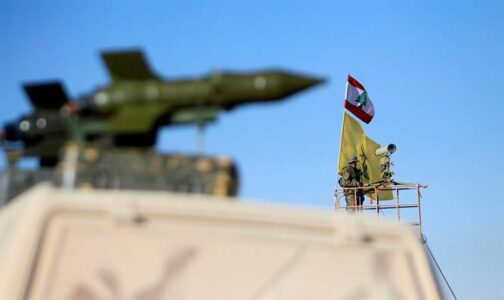
Hezbollah terrorist group storing massive weapons depot next to a school
The Israel Defense Forces on Wednesday revealed the location of an alleged Hezbollah arms cache in central Lebanon, saying a large quantity of explosives was being stored in a building across the street from a school.
According to Israeli assessments, explosives with roughly half the destructive power of the massive blast that leveled huge swaths of Beirut last year were being kept in the building in the village of Ebba.
The military refused to elaborate on the nature of the weaponry it suspected was being kept in the building.
The IDF anticipated that following its exposure of the site, Hezbollah would quickly empty the structure and move any munitions inside elsewhere.
While this would deny the military a target for attack in any future conflict, the army said it was prepared to show its hand now, signaling to Hezbollah the depth of its intelligence-gathering and exposing to the world the terror group’s apparent endangerment of children.
The IDF said it had information about “thousands” more Hezbollah targets.
“Hezbollah intended to use this against IDF soldiers and citizens of Israel. This storehouse was located in the heart of a civilian population in Lebanon, mere meters from a school,” the IDF wrote.
“Like this target, there are thousands of similar ones belonging to Hezbollah, which endanger the lives of Lebanon’s citizens,” the military said.
Satellite images of the alleged warehouse show a four-story building across the street from Ebba Public School, which the IDF said was attended by roughly 300 students. In addition to identifying the location of the alleged weapons cache, the military also released photographs of the school itself.
In recent years, Israel has adopted a policy of “naming and shaming” Hezbollah personnel and assets in an effort to force the terror group to change its tactics without the need for military strikes that could raise the likelihood for a large, violent confrontation.
Such was the case in 2018 and 2020, when then-prime minister Benjamin Netanyahu revealed, during speeches to the United Nations General Assembly, the locations of multiple sites being used by the terror group to develop precision-guided missiles in Beirut.
Israel has long accused Hezbollah of maintaining weapons depots inside civilian homes and within densely populated areas, using residents as human shields. Hezbollah has rejected specific allegations made by Israel over the years, taking journalists on closely controlled visits to the sites to prove there were no weapons there, but it has not broadly denied operating within civilian areas.
The decision to reveal the site Wednesday appeared to be tied to a broader emerging belief in the IDF that it needs to proactively establish its justifications for attack ahead of and during conflicts. This followed major international criticism for an airstrike on a building in Gaza City during May’s conflict in the Strip that housed a number of major media outlets, including the Associated Press, which Israel says also contained Hamas and Palestinian Islamic Jihad intelligence offices.
It took several days before the military released information about the building. The IDF now believes that it should act far faster to provide evidence and reasons for conducting attacks.
The village of Ebba is located in central Lebanon, in the Nabatieh region, northeast of the city of Tyre and about 20 kilometers (12 miles) from Israel.
Hezbollah storing weapons there would amount to a violation of the United Nations Security Council’s Resolution 1701, which ended the 2006 Second Lebanon War and required all Lebanese armed groups besides the military to remain north of the country’s Litani River.
“We see that the Hezbollah organization, as an operational tactic, consistently uses civilian assets for military activities. On the other hand, the IDF and the Northern Command use all means available in order to reduce the harm to civilians, but at the same time, the IDF will not hesitate to strike active targets,” the military said in a statement.
UNIFIL, the UN peacekeeping force charged with keeping southern Lebanon free of armed Hezbollah members, did not immediately respond to a request for comment.
Israel last fought Hezbollah in a large-scale conflict in the 2006 war. The 34-day war, which saw thousands of Hezbollah rockets pummel northern towns, claimed the lives of 165 Israelis, including 44 civilians. Over 1,100 Lebanese, including both Hezbollah fighters and civilians, were killed.
Source: TOI





